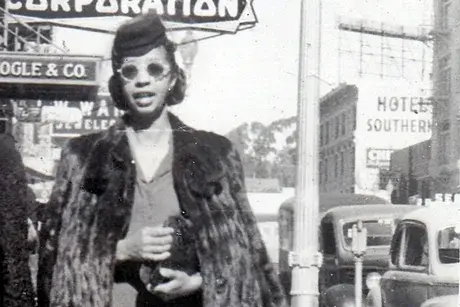RWU Law Will Dedicate Classroom to RI's First African-American Woman Lawyer
First Circuit Judge O. Rogeriee Thompson will deliver keynote on Dorothy R. Crockett, admitted to the bar in 1932 as one of state’s first seven women allowed to practice law.

BRISTOL, R.I., September 4, 2019 – Next Tuesday, Roger Williams University School of Law will dedicate a classroom to an extraordinary woman who, in 1932, became Rhode Island’s first African-American woman lawyer.
In a time of widespread racial and gender discrimination, Dorothy Russell Crockett Bartleson (1910-1955) undertook an astonishing journey to complete law school, pass the bar exam and become, at age 21, the state’s seventh female lawyer. Research indicates that she was the sole woman admitted to the state bar in the 1930s, and the only black woman to join until the 1970s.
The classroom dedication event will be held in the Honorable Bruce M. Selya Appellate Courtroom (Law 283, 2nd floor) at the RWU Law campus in Bristol, R.I., on Tuesday, September 10, 2019, at 4:00 p.m. The Honorable O. Rogeriee Thompson, United States Court of Appeals for the First Circuit will deliver the keynote. Students will speak of the significance of Crockett's achievements for both women and people of color. Citations will be presented by the offices of Congressman David Cicilline (R.I.), Governor Gina Raimondo and Providence Mayor Jorge Elorza. Finally, Crockett’s daughter, Dianne Bartleson of Surprise, Ariz., will share a few family photographs and personal comments about her mother, and cut the ribbon for the Dorothy R. Crockett Classroom (Law 285). A reception will follow.
“The Dorothy R. Crockett Classroom dedication is meaningful for the RWU Law community because there is a through line from Dorothy to our student body, which is now majority female and increasingly made up of students of color,” said RWU Law Dean Michael Yelnosky.
“Dorothy is significant to our alumni as well,” Yelnosky added. “For example, this year three of our African-American alumni, one a woman, have been sworn in as judges in Rhode Island. And finally, honoring Dorothy Crockett helps all the members of the Rhode Island bar learn more about the history of the profession in this state. Playing a role in exploring that history is a natural for this law school.”
This focus on a woman of color is significant, and I am so delighted that the School of Law is leading in this way by honoring Dorothy’s place in Rhode Island legal history.
~ Ame O. Lambert, Ph.D., RWU Chief Diversity Officer
The event’s significance to Roger Williams University extends beyond the law school as well.
“Dorothy Crockett’s legacy is one I relate to personally, as the only vice president of color here,” said Ame O. Lambert, Ph.D., Vice President for Equity and Inclusion and Chief Diversity Officer at Roger Williams. “Being a pioneer or an ‘only’ often means having no solid frame of reference, or not being able to ever find your true equilibrium. You face unique realities that are hard to articulate to anyone else, because no one else is sharing the experience you are having in quite the same way.”
For this reason, Lambert said, it’s important to remember and honor pioneers such as Crockett.
“It is very helpful to look to, and learn from, those who dealt with larger and more intense challenges than you will ever face,” Lambert observed. “I can only imagine the inner fortitude [Crockett] must have had to make it through obstacle after obstacle. I hope that, somewhere along the line, she had a sense that her work mattered and that she was making it better for others.”
An Enduring Legacy
Researchers at the Roger Williams Law Library first unearthed Crockett’s story while digging through records for the First Women Attorneys of Rhode Island project in 2017-18. In the months since then, they have gradually filled in the details using court records, genealogical resources and newspaper archives. Daughter Dianne Bartleson finds it heartening that her mother is receiving this honor, albeit some nine decades after her groundbreaking achievement.
“I would like my mother to be remembered as a pioneer, a trailblazer,” she said. “Any time a black person is the first to do something it is important, because all of the advances that are possible for us in this day and age — they all rely on what our ancestors have done in the past. Becoming an attorney is an accomplishment, and to have become the first black woman in the state to do so, that’s an accomplishment. So I’m really glad this research is being done.”
Still, her sense of loss is palpable.
“I wish my mother had lived long enough to influence me,” Bartleson mused. “I probably would have been encouraged to obtain a law degree myself. I just wish I could talk to her about it – to find out how it all happened, what motivated her. But there’s nobody to ask. That part is kind of sad.”
Lambert, however, argued that Crockett's impact is indelible.
“Change always requires courage,” she said. “Someone to step into the fray and carry the load. This classroom dedication will remind the many who will [in the future] courageously step into the fray that they are not alone, even when it feels like they are. Others have come before them, done their part and carried their share of the load – and now it is their turn.”
It is also significant, she noted, that Crockett represents an important step forward for both women and people of color.
“Women of color often get lost in a single-identity focus,” Lambert explained. “They are overlooked in the ‘women’ conversation and overlooked in the ‘people of color’ conversation. So this intersectional focus on a woman of color is significant, and I am so delighted that the School of Law is leading in this way by honoring Dorothy’s place in Rhode Island legal history.”
